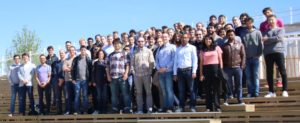*** FINAL CALL*** There are only 2 days remaining to submit your funding pre-proposals for workshops between 1 April 2020 and 31 March 2021. The deadline for pre-proposals is this Friday, 30 August!
Herewith we solicit for proposals for activities in the field of electronic-structure theory and calculations to be held between 1 April 2020 and 31 March 2021, to be funded (in full/partially) by the Psi-k Network and Charity.
Please note: for this year only events that take place between mid-August and mid-October 2020 will NOT be considered for funding to avoid a clash with the Psi-k Conference that will take place in Lausanne, September 2020.
Psi-k has introduced a two-step application process, to improve planning and avoid duplication of efforts.
First, a pre-proposal should be submitted by Friday 30 August 2019 (midnight CEST), describing the planned event. The working groups (https://psi-k.net/groups/) will either approve this pre-proposal for full submission, reject it, or suggest a merger between different activities – you are very welcome to contact the working group leaders or members beforehand. Continue reading Psi-k Workshop Funding 2020 – only 2 days left to submit!


